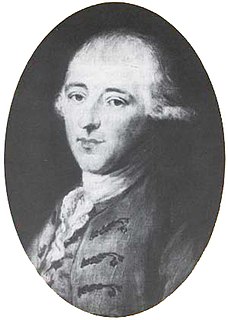 W
WPierce Butler was an Irish-American South Carolina rice planter, slaveholder, politician, an officer in the Revolutionary War, and one of the Founding Fathers of the United States. He served as a state legislator, a member of the Congress of the Confederation, a delegate to the 1787 Constitutional Convention, and a member of the United States Senate.
 W
WOther notable men have similar names, see: William Drayton (disambiguation).
 W
WNicholas Eveleigh was an American planter and political leader who was a delegate to the Continental Congress for South Carolina in 1781 and 1782.
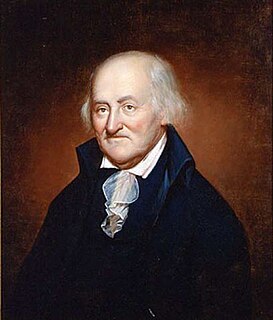 W
WChristopher Gadsden was an American politician who was the principal leader of the South Carolina Patriot movement during the American Revolution. He was a delegate to the Continental Congress, a brigadier general in the Continental Army during the American Revolutionary War, Lieutenant Governor of South Carolina, a merchant, and the designer of the Gadsden flag. He is a signatory to the Continental Association and is considered one of the Founding Fathers of the United States.
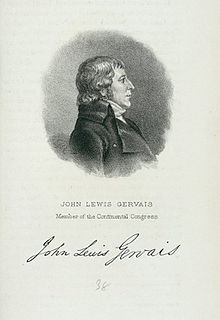 W
WJohn Lewis Gervais (1741–1798) was an American planter and statesman from South Carolina. He served as a delegate to the Continental Congress in 1782 and 1783.
 W
WThomas Heyward Jr. was a signer of the United States Declaration of Independence and of the Articles of Confederation as a delegate of South Carolina.
 W
WDaniel Huger was an American planter and statesman from Berkeley County, South Carolina.
 W
WRichard Hutson was an American lawyer, judge, and politician from Charleston, South Carolina. He was born in June 1747 to Rev. William Hutson and Mary Hutson. His family moved to Charleston in 1756 when his father was the pastor at the Circular Congregational Church. After having been educated in Charleston as a child, he attended Princeton.
 W
WRalph Izard was a U.S. politician. He served as President pro tempore of the United States Senate in 1794.
 W
WJohn Kean was an American merchant, banker and member of the Continental Congress from South Carolina who was the first in a long line of American politicians.
 W
WFrancis Kinloch was an American lawyer and rice planter from Georgetown, South Carolina. He served as a delegate for South Carolina to the Continental Congress in 1780.
 W
WHenry Laurens was an American merchant, slave trader, and rice planter from South Carolina who became a political leader during the Revolutionary War. A delegate to the Second Continental Congress, Laurens succeeded John Hancock as President of the Congress. He was a signatory to the Articles of Confederation and President of the Continental Congress when the Articles were passed on November 15, 1777.
 W
WThomas Lynch (1727–1776) was an American planter and statesman from South Carolina. He was a delegate to the Stamp Act Congress of 1765 and the Continental Congress from 1774 to 1776.
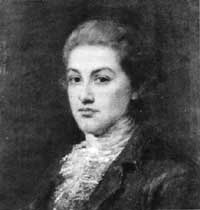 W
WThomas Lynch Jr. was a signer of the United States Declaration of Independence as a representative of South Carolina; his father was unable to sign the Declaration of Independence because of illness.
 W
WJohn Mathews was an American lawyer from Charleston, South Carolina. He was a delegate to the Continental Congress from 1778 to 1781 where he endorsed the Articles of Confederation on behalf of South Carolina. On his return, he was elected the 33rd Governor of South Carolina, serving a single term in 1782 and 1783.
 W
WArthur Middleton, of Charleston, South Carolina, was a signatory of the United States Declaration of Independence.
 W
WHenry Middleton was a planter and public official from South Carolina. A member of the colonial legislature, during the American Revolution he attended the Continental Congress and served as that body's presiding officer for a few days in 1774. He left Congress before it declared independence. Back in South Carolina, he served as president of the provincial congress and senator in the newly created state government. After his capture by the British in 1780, he accepted defeat and returned to the status of a British subject until the end of the war.
 W
WIsaac Motte was an American soldier and statesman from Charleston, South Carolina. He served as a colonel in the Revolutionary War and represented South Carolina in the Continental Congress from 1780 to 1782.
 W
WJohn Parker IV by birth inherited a spot in South Carolina's aristocracy. He was born to John Parker III and Mary Daniell, granddaughter of Governor Robert Daniell. He married Susannah Middleton, daughter of Henry Middleton and sister of Arthur Middleton. He was American planter of the Hayes Plantation and lawyer from Charleston, South Carolina. He also served as a delegate for South Carolina to the Congress of the Confederation from 1786 to 1788.
 W
WCharles Pinckney was an American planter and politician who was a signer of the United States Constitution. He was elected and served as the 37th Governor of South Carolina, later serving two more non-consecutive terms. He also served as a US Senator and a member of the House of Representatives. He was first cousin once removed of fellow signer Charles Cotesworth Pinckney.
 W
WDavid Ramsay was an American physician, public official, and historian from Charleston, South Carolina. He was one of the first major historians of the American Revolutionary War. During the Revolution he served in the South Carolina legislature until he was captured by the British. After his release he served as a delegate to the Continental Congress in 1782–1783 and again in 1785–1786. Afterwards he served in the state House and Senate until retiring from public service. In 1803, Ramsay was elected a member of the American Philosophical Society in Philadelphia. He was murdered in 1815 by a mentally ill man whom Ramsay had examined as a physician. He is the first American politician to be assassinated.
 W
WJacob Read was an American lawyer and politician from Charleston, South Carolina. He represented South Carolina in both the Continental Congress (1783–1785) and the United States Senate (1795–1801).
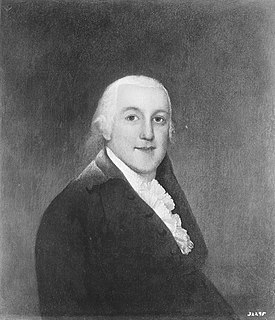 W
WEdward Rutledge was an American politician and youngest signatory of the United States Declaration of Independence. He later served as the 39th Governor of South Carolina.
 W
WJohn Rutledge was an American politician and jurist who served as one of the original associate justices of the Supreme Court and the second chief justice of the United States. Additionally, he served as the first President of South Carolina and later as its first governor after the Declaration of Independence.
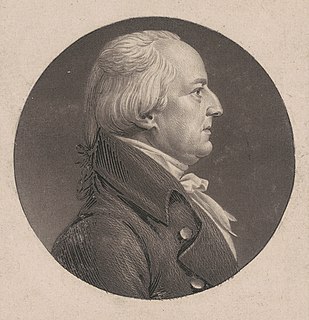 W
WThomas Tudor Tucker was a Bermuda-born American physician and politician representing Charleston, South Carolina. He was elected from South Carolina in both the Continental Congress and the U.S. House. He later was appointed as Treasurer of the United States and served from 1801 to his death in 1828, establishing a record as the longest-serving Treasurer.